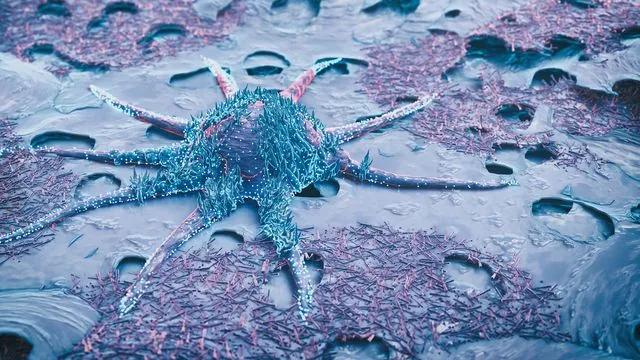
Revolutionary CAR T-Cell Therapy Offers New Hope for Treating HER2-Positive Solid Tumors
2024-11-19
Author: Jia
Introduction
In an exciting breakthrough for breast cancer treatment, researchers at the Vall d'Hebron Institute of Oncology (VHIO) and the Cancer Research Program of Hospital del Mar Research Institute (HMRIB) in Barcelona have unveiled a novel chimeric antigen receptor (CAR) T-cell therapy designed specifically for HER2-positive tumors. This new approach targets the P95HER2 protein, known to correlate with more aggressive forms of breast cancer and poorer patient prognosis. One-third of HER2-positive (HER2+) tumors express this troublesome protein, making this development particularly crucial for those affected.
Innovative Mechanism of Therapy
The innovative therapy entails engineering T cells to express a CAR targeting P95HER2, which then secretes a bispecific antibody, TECH2Me. This antibody not only identifies tumor cells but also activates immune cells within the tumor microenvironment (TME), enhancing the body’s ability to combat cancer. Preclinical studies of the therapy utilized patient-derived models of HER2+ P95HER2-expressing solid tumors, yielding promising results.
Clinical Implications and Safety
Findings published in Nature Communications indicate that this new CAR T-cell therapy has demonstrated complete and durable antitumor responses in a specific subset of HER2+ tumors, showing safety in its application. Following these encouraging preclinical results, the team is pushing forward with plans for a first-in-human phase 1 clinical trial aimed at evaluating this groundbreaking therapy in patients suffering from HER2-overexpressing tumors.
Research Support and Leadership
Under the auspices of Spain's Asociación Española Contra el Cáncer (AECC), this research has been financially supported since 2019, reflecting a concerted effort to develop cutting-edge therapeutic strategies against HER2-positive breast cancer. Led by Joaquín Arribas, a prominent figure in cancer research, the team has been working diligently to push the boundaries of what is possible in treating this challenging form of cancer.
Why CAR T-Cell Therapy is a Game Changer for Cancer Treatment
CAR T-cell therapy has revolutionized cancer treatment over recent years, especially for blood cancers. This form of therapy involves the genetic alteration of a patient’s T lymphocytes so they can recognize and attack cancer more effectively. However, prior challenges in treating solid tumors have limited the potential applications of CAR T-cell therapies. Joaquín Arribas emphasizes this point, noting the therapy's previous successes in hematological cancers but highlighting the urgent need for advancements in solid tumor treatments.
HER2's Role in Tumor Aggressiveness
HER2 plays a critical role in normal epithelial cell function, but its overexpression in tumors is associated with more aggressive growth and reduced effectiveness of traditional therapies. An estimated 4% of tumors and about 15% of breast cancers display HER2 overexpression, with one-third of these also expressing the aggressive P95HER2 variant.
Challenges in Treatment
While several therapeutic options exist for HER2-positive cancers, many patients, particularly those with advanced-stage disease, find themselves without effective treatment alternatives. With the VHIO’s Growth Factors Group focusing on innovative therapies that bolster the immune system's fight against HER2-driven tumors, hope is on the horizon for patients who have limited options.
The Next Generation of CAR T-Cell Therapy
The recent study has shown that the engineered CAR T cells can secrete the TECH2Me antibody, thus avoiding damage to normal HER2-expressing cells while enhancing the immune response against cancer cells. Utilizing innovative in vitro and in vivo models, researchers observed that the new CAR T therapy can lead to tumor shrinkage and, in some cases, complete disappearance of sizeable tumors in test subjects.
Optimism Among Researchers
Macarena Román, a postdoctoral researcher involved in the study, has expressed optimism about the new findings, stating, “We observed that this new CAR-T achieved safe, complete, and durable responses. Importantly, these mice lived for months without any observed decline in their quality of life.”
Future Prospects
As we eagerly await the commencement of the phase 1 clinical trial, expected to start next year, the potential implications of this research are immense. Supported by AECC and the Instituto de Salud Carlos III, the study aims to recruit 15 patients whose cancer has progressed despite available treatments. If successful, this therapeutic approach could open new doors for improving outcomes in patients battling HER2-positive tumors.
Conclusion
This significant advancement not only illuminates a path forward for individuals struggling with one of cancer's toughest opponents but also underscores the remarkable capabilities of modern science in the relentless fight against disease.


 Brasil (PT)
Brasil (PT)
 Canada (EN)
Canada (EN)
 Chile (ES)
Chile (ES)
 España (ES)
España (ES)
 France (FR)
France (FR)
 Hong Kong (EN)
Hong Kong (EN)
 Italia (IT)
Italia (IT)
 日本 (JA)
日本 (JA)
 Magyarország (HU)
Magyarország (HU)
 Norge (NO)
Norge (NO)
 Polska (PL)
Polska (PL)
 Schweiz (DE)
Schweiz (DE)
 Singapore (EN)
Singapore (EN)
 Sverige (SV)
Sverige (SV)
 Suomi (FI)
Suomi (FI)
 Türkiye (TR)
Türkiye (TR)